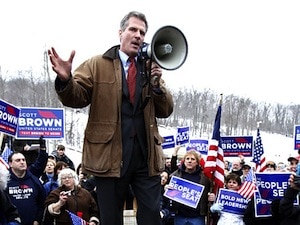With a straight face, Republican Senator Scott Brown told a crowd in Massachusetts this week that “oil companies don’t get subsidies” from the federal government. Brown tells us that, just like other companies, they are able to “take deductions,” but nothing more.
The League of Conservation Voters (LCV) was quick to jump on the story, compiling an astounding array of information that proves that Scott Brown is either the most misinformed member of Congress when it comes to subsidies, or that he’s a plain old liar. From an LCV press release:
Experts say oil company tax credits are essentially the same as direct spending subsidies. In a May 5, 2011 article, the Center for American Progress noted: “[T]he tax code is stuffed with a host of subsidies for oil and gas. These subsidies are delivered through the tax code but they are essentially no different from government spending programs that provide money directly.” Additionally, citing nonpartisan organizations including the Tax Policy Center and Pew Charitable Trusts, Media Matters for America documented in an April 10 article that “experts say that [oil industry tax] incentives – legally categorized as tax expenditures – have effects similar to more direct cash transfers from the government.” The Tax Policy Center stated that “Tax expenditures operate essentially like direct expenditures, even though they appear as tax breaks.” Pew’s SubsidyScope.org website stated: “Tax expenditures have a similar effect on the federal deficit as government spending. They can also have effects on recipients that are similar to grants or other types of subsidies.” [Center for American Progress, 5/5/11; Media Matters for America, 4/10/12].
Prominent members of Scott Brown’s own party recognize that tax expenditures are subsidies. In a March 28 article, Think Progress documented that “Numerous Republican leaders have noted that a tax break is the same as a direct government [payment] or subsidy, in a different form. This includes President Ronald Reagan’s chief economic advisor, Martin Feldstein, former Senate Budget Committee Chair Pete Domenici (R-NM), House Ways and Means Committee Chair Dave Camp (R-MI), and Speaker of the House John Boehner (R-OH).” Think Progress included quotes for each of these Republicans in the article. [Think Progress, 3/28/12].
Not only does the oil industry receive subsidies from the federal government, but as the LCV points out, earlier this year, Scott Brown actually voted against repealing the subsidies for the oil industry, that are currently costing U.S. taxpayers as much as $7 billion a year.
Brown appears to be suffering from a disease we’ll call “subsidy amnesia.” He can claim that the subsidies don’t exist all he wants, but the cold, hard truth is that he’s voted for these very subsidies “that don’t exist.”
Perhaps his amnesia is the result of the $227,000 that the oil and gas industries have put into his campaign, according to the Center for Responsive Politics.
The truth is that everyone in the country that has been paying attention – from elected officials to average citizens – is well aware of the massive tax dollar giveaways that the oil industry receives every year. And every time the measure to repeal these subsidies comes up for a vote, Republicans vote it down. And for all of their complaining about “wasteful” government spending, they have no problem with calling these subsidies a “drop in the bucket” because it’s just a mere “few billion” every year.
This subsidy amnesia is really no big shocker at all. After all, this is coming from the same Republican Senator who voted against allowing the EPA from regulating greenhouse gas emissions, even after the U.S. Supreme Court told the agency that they were obligated to do so.
Brown is facing a fierce electoral battle this year against Democratic challenger Elizabeth Warren, and a gaffe like this could do serious damage to a campaign when voters are already visibly angry about the subsidies that are flowing to the oil industry each year.
Subscribe to our newsletter
Stay up to date with DeSmog news and alerts






